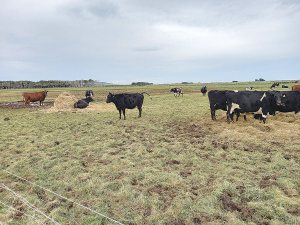NZ Catchment Groups Thrive with ‘Source to Sea’ Approach
The most successful catchment groups in NZ are those that have 'a source to sea' approach.
 Cows managed on pasture with hay also had higher skin temperatures and cleaner coats, according to the study.
Cows managed on pasture with hay also had higher skin temperatures and cleaner coats, according to the study.
Dairy cows managed in winter on pasture, with hay bales, spent more time ruminating and lying in postures suggesting greater comfort than those on kale crops, newly published research has found.
Cows managed on pasture with hay also had higher skin temperatures and cleaner coats. The results suggest the greater opportunities for thermal comfort on pasture with hay may be due to both increased rumination activities and a more insulated lying area.
AgResearch scientists joined with colleagues from Massey University in carrying out the study on NZ dairy farms with 80 Friesian cross-bred (Friesian and Jersey), nonlactating and pregnant cows, in the winter of 2022.
The published research states: “In countries with pasture-based dairy systems and relatively cold winters, such as New Zealand, it is common to manage pregnant, nonlactating cows on forage crop paddocks rather than pasture due to slow pasture growth rates. Wintering dairy cattle on grazed crops can compromise welfare if wet and muddy underfoot conditions occur, which can reduce lying. This study investigated behavioural and physiological indicators of welfare of cows under 2 wintering practices: cows managed on and grazed kale crop, and cows managed on pasture with baled hay.”
AgResearch senior scientist Karin Schütz says the research was the first of its kind to show cows were warmer in a hay bale grazing system than forage crops.
“Our research has shown that bale grazing systems can provide cows with several welfare benefits and help them conserve energy and maintain normal body temperature,” Schütz says.
“The diet of pasture and hay promotes rumination throughout the day and night which helps with thermoregulation when the weather is cold. The hay litter left from the hay bales gives the cows an insulated and soft surface to lie down and rest on, which we know cows prefer.
Research into these different wintering systems has also demonstrated environmental benefits, in addition to those for the animals.
AgResearch senior scientist Ross Monaghan says environmental benefits observed in trials included greater opportunity to capture urinary nitrogen in the hay bale system, and therefore less nutrient loss, as well as less mud and soil damage.
The research into animal behaviour/welfare in different systems received funding from the Ministry for Primary Industries’ Sustainable Land Management and Climate Change (SLMACC) fund, and AgResearch.
For the full study, visit https://www.sciencedirect.com/science/article/pii/S0022030224007586
Dairy Women's Network (DWN) has announced that Taranaki dairy farmer Nicola Bryant will join its Trust Board as an Associate Trustee.
Rural Women New Zealand (RWNZ) says it welcomes the release of a new report into pay equity.
Red meat exports to key quota markets enjoyed $1.4 billion in tariff savings in the 2024-25 financial year.
Remediation NZ (RNZ) has been fined more than $71,000 for discharging offensive odours described by neighbours as smelling like ‘faecal and pig effluent’ from its compositing site near Uruti in North Taranaki.
Two kiwifruit orchards in the Bay of Plenty and one in Northland are this year's finalists for the Ahuwhenua Trophy competition.
The Government's chief science advisor, Dr John Roche says the key objective for the science sector in the coming year is bedding down the reforms which sees the merger of the previous entities.

OPINION: A mate of yours truly reckons rural Manawatu families are the latest to suffer under what he calls the…
OPINION: If old Winston Peters thinks building trade relations with new nations, such as India, isn't a necessary investment in…